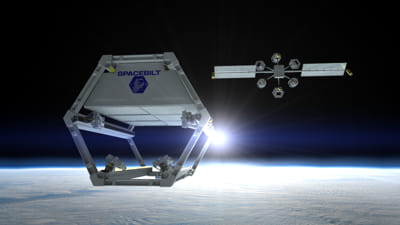SpaceBilt and Phison in Partnership
To provide space server with 100TB+ at the International Space Station in 2025
This is a Press Release edited by StorageNewsletter.com on April 10, 2024 at 2:00 pmSpaceBilt, Inc. has partnered with Phison Electronics Corp. to fly the Large in Space Server (LiSS), the world’s first 100TB+ storage and edge compute center to the International Space Station (ISS) in 2025.

The LiSS will be flight qualified on the Japanese Kibo External Facility on the SpaceBD iSEEP platform to ensure its readiness to withstand the space environment. SpaceBilt and partner Novium will provide demonstrations of a mockup space station at the Space Symposium from April 8-11, 2024 in Colorado Springs, CO.
The LiSS project will qualify for the NASA Technology Readiness Level 8 (TRL-8), which is ready for commercialization. The LiSS server system is powered by a Microchip Polarfire SoC)along with an NVIDIA Jetson Orin AI computer for rapid access to a string of X1 enterprise PCIe-based SSDs provided by Phison, a provider of NAND controllers and storage.
During this flight qualification of the X1 platform, SpaceBilt will monitor the radiation environment by leveraging the flight ARMAS radiation sensor provided by Los Angeles-based Space Environmental Technologies. Phison is supplying the technical expertise to enable SpaceBilt to access engineering data associated with the performance of the X1 SSD drives in the radiation and vacuum environment of space.
This 6 month test will yield qualitative data on the performance of SSD drives in the space environment – a critical aspect that remains largely unexplored for these advanced SSDs. The findings from this study are pivotal for numerous companies aiming to pioneer edge computing and storage technologies in space, shedding light on a key frontier in their endeavors.
“Risk reduction activities such as the LiSS mission are crucial to our efforts to field advanced spacecraft with compute, storage and communications systems for the 21st century,” said Dennis Wingo, CTO, SpaceBilt. “Qualitative data of the type that we will obtain from this mission will allow us to move directly to flight for petabyte-level server systems for customers interested in advanced servers in space.“
“From data security, low latency, satellite communications to supporting emerging technologies, companies are eyeing a space-based data infrastructure,” said Sebastien Jean, CTO, Phison US. “The LiSS project will play a key role in accelerating servers in space; our joint mission validates the technology needed to ensure successful implementation and ongoing operations in space.“
In 2022, Santa Clara-based SpaceBilt flew a prototype of a Microchip Polarfire RISC-V Linux OS-based avionics package and data server to support the flight qualification of robotic connectors on the ISS through the sponsorship of CASIS, the ISS National Laboratory, and funded by the Defense Innovation Unit. In 2024, a similar package will fly to the moon with a commercial customer, along with a SpaceBilt-sponsored ARMAS radiation sensor to provide the first qualitative data on Phison M.2 SSD performance in the Cislunar and lunar surface environment. The upcoming flight is sponsored by SpaceBilt and the Department of Defense’s Defense Innovation Unit as a risk reduction exercise for the multi-Orbit Logistics Vehicle.
Phison’s upcoming SpaceBilt flight to the International Space Station marks a return to space for the company. Phison’s 8TB M.2 2280 SSD solution was previously selected to take part in Lonestar Data Holdings’ historic first lunar data center mission.














 Subscribe to our free daily newsletter
Subscribe to our free daily newsletter


